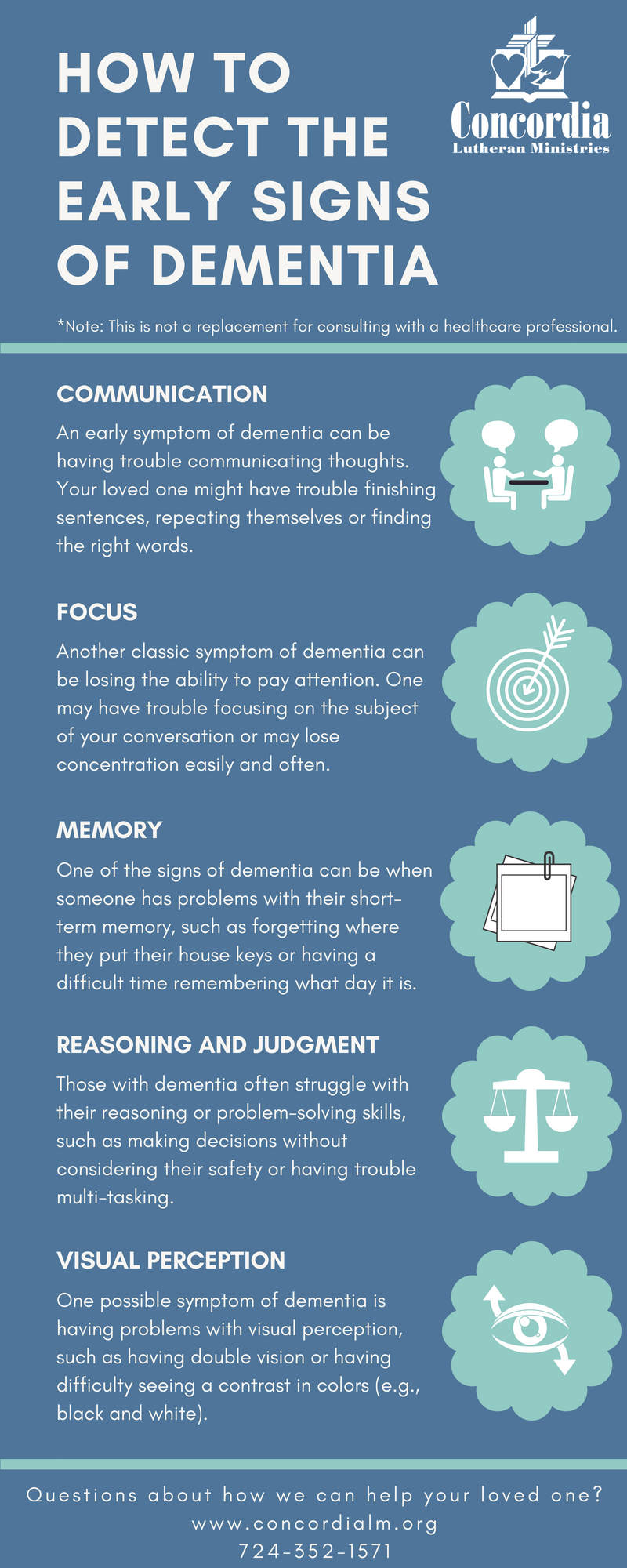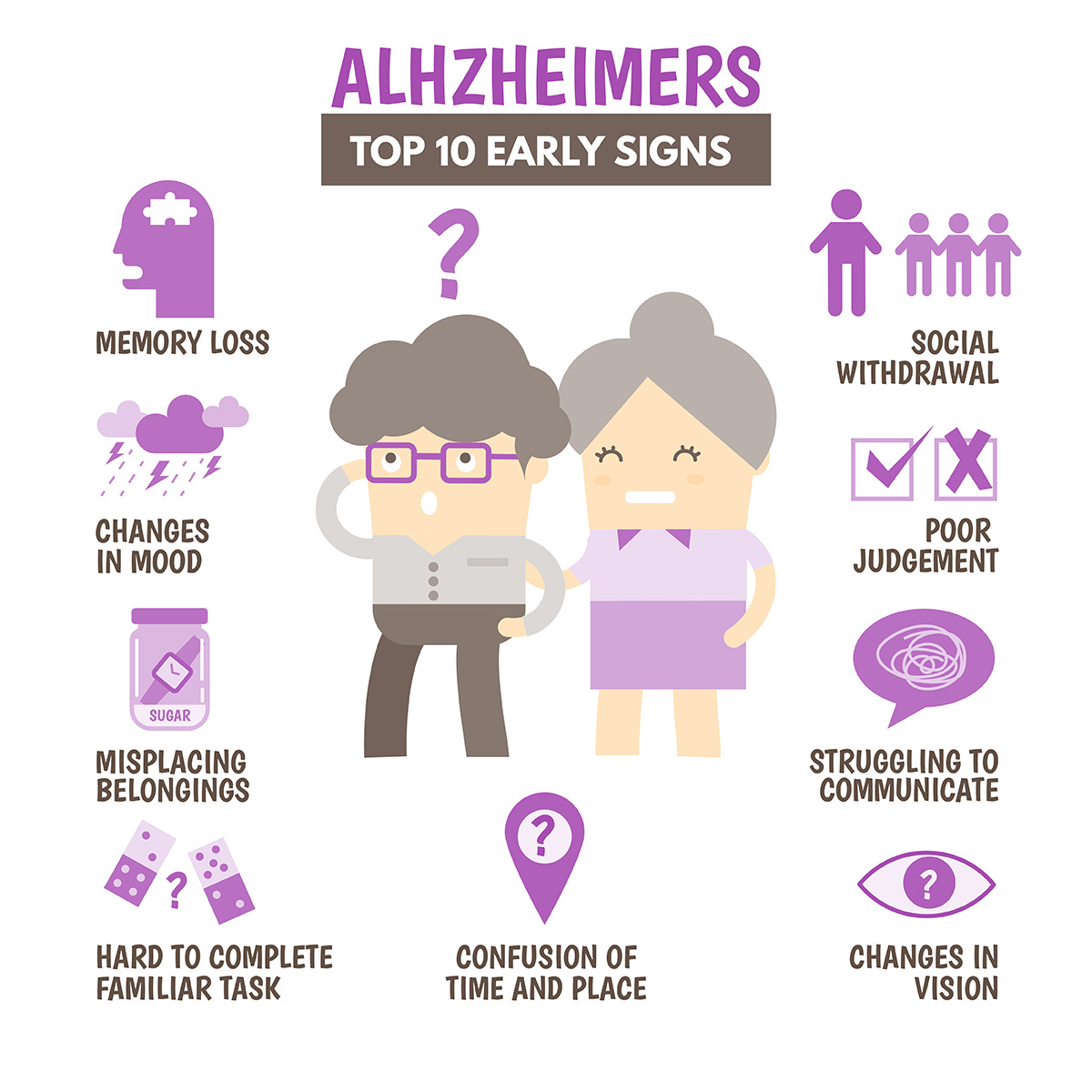What to Expect in the First Year After an Early Onset Dementia Diagnosis
What to Expect in the First Year After an Early Onset Dementia Diagnosis
Blog Article
Comprehending the Effect of Dementia on Daily Life and Caregiving
Dementia influences life in extensive means, impacting not simply those identified yet additionally their caregivers. As cognitive decline advances, you might observe modifications in communication and routine that obstacle both parties. Understanding these shifts is crucial for keeping self-respect and engagement. How do you adapt your caregiving strategies to sustain someone traversing this complicated trip? The solutions may shock you as we discover the nuances of this experience.
The Stages of Mental Deterioration and Their Impacts on Day-to-day Live
As you browse the journey of mental deterioration, recognizing its phases can markedly impact exactly how you take care of day-to-day life. Mental deterioration typically proceeds via 3 major phases: early, middle, and late.
Throughout the middle stage, you'll experience more visible cognitive decline. Daily tasks might end up being tough, and preserving your independence may call for changes. Making use of suggestions and simplifying your atmosphere can help.
In the late stage, individuals often need substantial assistance with everyday activities. Preparation for treatment becomes vital, focusing on convenience and high quality of life. By recognizing these phases, you're far better outfitted to react proactively, guaranteeing you or your enjoyed one can browse the obstacles with dignity and grace.

Changes in Communication and Social Communication
Just how do modifications in interaction affect your daily communications as dementia progresses? As dementia advancements, you may notice that easy discussions become tough. Words might leave you, or you may have a hard time to locate the appropriate expressions. This can cause aggravation for both you and your loved ones. Nonverbal signs, like gestures or faces, end up being progressively crucial.
You might locate it easier to connect through these ways as opposed to relying exclusively on spoken language. Listening skills can additionally alter; you might locate it more difficult to remember or adhere to conversations what was simply stated (Early Onset Dementia). This can result in misconceptions or sensations of seclusion
Urging perseverance and producing an encouraging environment can assist. Taking part in tasks that cultivate link, like music or art, can enhance social communications. Remember, keeping relationships is still possible; it's nearly adapting to brand-new means of interacting.
Effect On Daily Routines and Activities
While steering daily routines, you'll likely discover that jobs you when completed easily ended up being much more challenging as dementia advances. Straightforward activities like food preparation, dressing, and even showering might call for more effort and time. You might discover yourself failing to remember steps in acquainted routines or having a hard time to recall where you placed things. This can lead to irritation not simply for you, however additionally for those around you.
Adapting your setting can assist; for instance, classifying products or making use of checklists can streamline jobs. Involving in repeated, organized tasks can additionally supply comfort and a sense of success. Keep in mind, it's okay to ask for assistance.
Psychological and Behavioral Obstacles
Steering through everyday regimens can cause not just sensible difficulties, yet behavioral and additionally emotional ones. You could discover adjustments in mood, such as increased anxiety or irritation, which can originate from confusion or trouble in finishing tasks. As you navigate these minutes, it is important to identify that your liked one may reveal their sensations through actions like agitation or withdrawal.
These emotional feedbacks can be unforeseeable and may occur without warning, leaving you both feeling overwhelmed. You may find that familiar atmospheres or routines can help in reducing anxiousness, however maintaining patience ends up being substantial. It is vital to verify their feelings, also if you do not totally understand them.
The Role of Caregivers in Supporting People With Mental Deterioration
As a caregiver, you play a crucial role in supplying psychological assistance for people with dementia. Establishing everyday treatment routines can create a sense of stability and comfort, assisting to alleviate their anxiousness. By understanding their demands and utilizing reliable strategies, you can significantly enhance their lifestyle.
Psychological Support Techniques
When looking after somebody with dementia, comprehending the psychological landscape is necessary for offering efficient assistance. You'll usually locate that persistence and empathy go a lengthy way. Confirm their sensations; if they share complication or disappointment, acknowledge it without disregarding their feelings. Basic motions, like holding their hand or keeping eye get in touch with, can create a complacency. Try to take part in activities that they enjoy, as this can stimulate happiness and link. Remember to interact plainly and gradually, using a calm tone. Motivate expression through songs or art, which can act as a powerful electrical outlet. Ultimately, don't neglect to look after your own emotional demands; seeking support on your own can enhance your ability to look after them.
Daily Care Routines
Developing everyday care regimens is essential for providing stability and comfort to individuals with mental deterioration, as these routines can help in reducing confusion and stress and anxiety. You can start by detailing a consistent routine for dishes, tasks, and remainder. This predictability helps your enjoyed one feel a lot more safe and involved.
Incorporate acquainted tasks, like folding laundry or watering plants, which can stimulate favorable memories and promote a sense of achievement. Use visual cues, such as schedules or lists, to lead them via the day.
Be adaptable, though; adjust regimens as needed based on their mood or energy levels. Early Onset Dementia. Keep in mind, your perseverance and understanding are important in steering their changing demands, ensuring they really feel sustained and valued throughout their day-to-day live
Creating a Safe and Comfy Living Setting
Developing a comfortable and secure living environment is essential for people with dementia. You'll desire to make home safety and security modifications that minimize threats and assure knowledge to provide a feeling of convenience. By concentrating on these facets, you can assist produce an area that supports both security and health.
Home Security Adjustments
As you navigate the obstacles of mental deterioration, making home safety adjustments can significantly enhance convenience and security. Tag important locations, such as the shower room and kitchen area, with clear indicators to assist with alignment. These modifications not just advertise security yet also encourage independence, permitting your loved one to really feel more at convenience in their atmosphere.
Convenience and Experience
After making certain a safe environment with essential alterations, fostering comfort and knowledge is essential for people with mental deterioration. Beginning by individualizing their space. Use acquainted colors, decorations, and photographs that evoke satisfied memories. A favorite covering or chair can offer a feeling of security. Maintain a regular regular to help them really feel based and reduce anxiety. Straightforward, familiar meals can also produce a calming environment. Maintain paths clear and clutter-free to avoid confusion. Integrate soft illumination, as bright lights can be disorienting. Think about adding soothing aromas, like lavender, to promote relaxation. Participating in acquainted tasks, such as listening to songs or gardening, can boost their sense of belonging, making their living environment a real shelter.
Techniques for Efficient Caregiving and Support
While steering the difficulties of mental deterioration treatment can really feel overwhelming, implementing reliable approaches can greatly improve both the caretaker's and the patient's everyday experience. Start by developing a routine; predictability helps in reducing anxiousness for both you and your liked one. Use clear, easy communication-- straight questions and brief sentences can prevent complication.

Don't neglect to deal with yourself; routine breaks and connect with support groups. Sharing experiences with others in similar circumstances can offer important insights and psychological alleviation.
Lastly, remain person and adaptable. Mental deterioration can bring unpredictable modifications, so adapting your technique is necessary. By utilizing these methods, you can promote a much more favorable atmosphere that profits both you and your enjoyed one.
Often Asked Inquiries

What Are the Different Sorts Of Mental Deterioration?
You'll discover several types of dementia, including Alzheimer's, vascular dementia, Lewy body dementia, and frontotemporal dementia. Each type affects memory and cognitive function in a different way, so recognizing the differences is necessary for proper medical diagnosis and treatment.
Exactly How Can I Help Somebody With Early-Stage Mental Deterioration?
You can aid a person with early-stage mental deterioration by being person, supplying assistance, and urging them to participate in activities they enjoy. Maintaining routines constant and preserving open communication can also make a substantial distinction in their day-to-day live.
Are There Financial Resources Available for Mental Deterioration Care?
Yes, there are funds offered for mental deterioration care. You can discover federal government assistance programs, nonprofit companies, and insurance coverage options. It's additionally smart to seek advice from regional firms for specific sources customized to your circumstance.
What Lawful Considerations Should Caregivers Be Aware Of?
As a caregiver, you need to think about power of lawyer, health care proxies, and guardianship laws. It's vital to understand the legal civil liberties and duties you hold, guaranteeing your liked one obtains ideal care and defense.
How Can I Handle Caregiver Anxiety?
You can deal with caretaker anxiety by prioritizing self-care, looking for assistance from groups or good friends, setting practical assumptions, taking breaks, and practicing relaxation strategies. Keep in mind, your wellness matters equally as long as the individual you're caring for.
Recognizing the Influence of Mental Deterioration on Daily Life and Caregiving.
As you navigate the journey of mental deterioration, understanding its stages can considerably affect just how you manage day-to-day life.While steering everyday regimens, you'll likely see that tasks you as soon as completed effortlessly come to be more difficult as mental deterioration proceeds.Developing daily care regimens is crucial for providing stability and comfort to individuals with mental deterioration, as these regimens can help minimize complication and stress and anxiety.While navigating the difficulties of mental deterioration treatment can really feel frustrating, applying effective strategies can substantially improve both the caregiver's Frontotemporal Dementia and the client's everyday experience.
Report this page